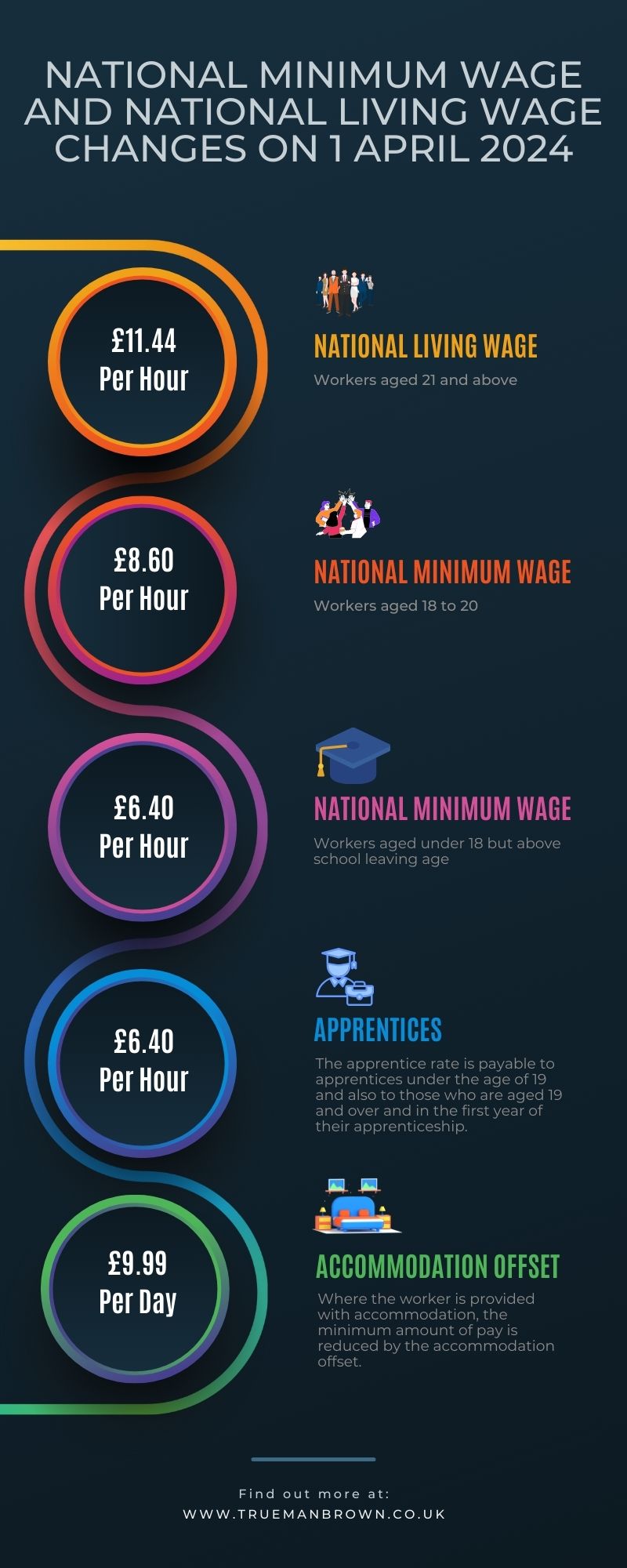Employers must pay their workers at least the statutory minimum wage for their age.
Depending on the age of the worker, they may be entitled to the higher National Living Wage (NLW) or the National Minimum Wage (NMW) for their age band.
It is important to note that the right to be paid at least the statutory minimum applies to ‘workers’, the definition of which is wider than employees.
The NLW and NMW are increased from April each year. In addition, the qualifying age limit for the NLW is reduced from 1 April 2024.
Lower age limit for the NLW
Currently, workers aged 23 and above are entitled to be paid the NLW. T
his is the highest rate of the NMW.
From 1 April 2024, the age limit is reduced, and all workers aged 21 and above must be paid at least the NLW.
New rates
The NLW and NMW rates applying from 1 April 2024 are set out in the table below.
| Rate | |
| National Living Wage – workers aged 21 and above | £11.44 per hour |
| National Minimum Wage – workers aged 18 to 20 | £8.60 per hour |
| National Minimum Wage – workers aged under 18 but above school leaving age | £6.40 per hour |
| Apprentice rate | £6.40 per hour |

Currently, the NLW is set at £10.42 per hour and is payable to workers aged 23 and above.
Workers aged 21 and 22 are entitled to receive a NMW of £10.18 per hour.
The NMW is set at £7.49 per hour for workers aged 18 to 20 and at £5.28 per hour for workers who have reached school leaving age but who are under the age of 18.
The apprentice rate is also £5.28 per hour.
The apprentice rate is payable to apprentices under the age of 19 and also to those who are aged 19 and over and in the first year of their apprenticeship.
Accommodation offset
Where the worker is provided with accommodation, the minimum amount of pay is reduced by the accommodation offset.
This is currently £9.10 per day (£63.70 per week).
It is increased to £9.99 per day (£69.93 per week) from 1 April 2024.
Giving effect to the increases
It is important that employers comply with the NMW legislation; penalties for non-compliance are high.
It is not necessary for the worker to be paid the NLW/NMW for every hour they work – what matters is that on average they receive the NLW/NMW for the hours worked in a pay reference period. For example, if a worker aged 35 is paid weekly and works a 40-hour week, from 1 April 2024 they must be paid at least £457.60 for the week’s work.
Although the new rates apply from 1 April 2024, they do not need to be paid from that date if it falls in the middle of a pay reference period.
Rather, the new rates must be paid from the start of the first pay reference period to begin on or after 1 April 2024.
For example, if the worker is paid weekly on a Friday, the new rates must be paid from the week commencing 6 April 2024.
However, if the worker is paid for the month on the last day of the calendar month, the new rates must be paid from 1 April 2024.
As well as increasing the rates, employers will need to ensure that workers aged 21 and 22 receive at least the NLW from 1 April 2024.
Trueman Brown Chartered Accountants: Your Partner in Tax Compliance
Navigating the intricate web of HMRC regulations can be overwhelming for landlords. Trueman Brown Chartered Accountants serve as invaluable allies, offering expert guidance to ensure compliance with tax regulations and bringing your tax affairs up-to-date.
Trueman Brown provides comprehensive services tailored to meet the specific needs of landlords:
- Tax Compliance Assistance: Meticulously analyzing financial records to ensure accurate reporting of rental income and expenses in compliance with HMRC guidelines.
- Deadline Management: Adeptly managing submission deadlines to prevent penalties or interest charges resulting from missed deadlines.
- Optimizing Tax Efficiency: Exploring legal avenues to maximize tax efficiency for landlords, ensuring they benefit from available deductions and reliefs while staying compliant.
In conclusion, HMRC’s vigilant methods in monitoring landlords’ rental income underscore the importance of accurate and timely reporting. Trueman Brown Chartered Accountants stand as reliable partners, guiding landlords through the complexities of tax compliance and empowering them to bring their tax affairs up-to-date while maximizing financial efficiency and avoiding the repercussions of non-disclosure.

Recent Comments